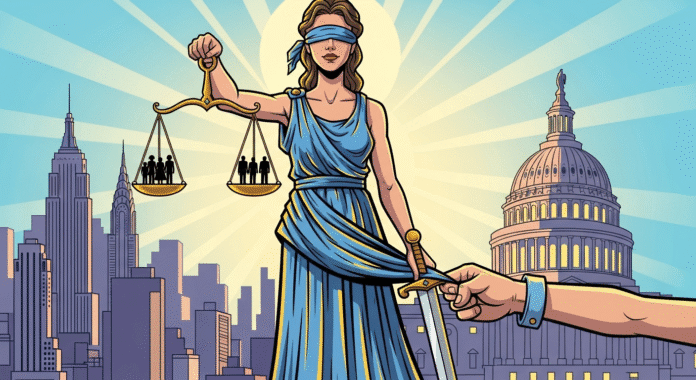A high-profile federal investigation raises critical questions about prosecutorial power, fairness in the justice system, and the future of American accountability.
In one of the most politically charged legal battles of recent times, the Department of Justice (DOJ) has launched an investigation into New York Attorney General Letitia James’ office—the same office that secured a landmark fraud case against former President Donald Trump. As the probe deepens, questions emerge over whether the actions taken against Trump were conducted within the bounds of legal fairness or if they hinted at a broader misuse of prosecutorial authority. By examining the layers of historical precedent, legal context, and public reactions, this article explains the facts behind the investigation while offering insights into its implications for the justice system and public trust.
The Facts: Unpacking the DOJ Investigation
The investigation centers on allegations that Letitia James’ office may have violated Trump’s constitutional rights while pursuing the high-stakes fraud case. At the heart of the controversy lies a civil fraud judgment against Trump and his organization, which resulted in penalties exceeding $450 million. Two grand jury subpoenas have been issued to probe whether the methods employed by James’ office—especially its aggressive pursuit of claims against Trump and the National Rifle Association—crossed legal lines.
The DOJ has maintained its standard practice of refraining from detailed public commentary during ongoing inquiries. However, the unfolding situation has ignited strong reactions on all sides. James’ office has described the investigation as a “blatant and desperate example” of politically motivated retribution, while Trump has used the probe to bolster his narrative of unjust persecution.
“Weaponizing the Department of Justice to try to punish an elected official for doing her job is an attack on the rule of law and a dangerous escalation by this administration,” stated Abbe Lowell, an attorney for Letitia James.
This clash of interpretations—between those who see the investigation as a necessary check on potential misuse of legal authority and those viewing it as a politically charged maneuver—forms the core of the debate.
Legal and Historical Context: Federal Oversight of State Prosecutors
Investigations into state-level prosecutors by the federal government are infrequent and steeped in legal nuance. The U.S. Constitution establishes a system of dual sovereignty, where state and federal legal systems operate separately. Yet, federal oversight has been justified in cases involving clear-cut federal violations, such as civil rights abuses or significant corruption.
Historically, the Department of Justice has intervened when state officials were suspected of using their positional power to infringe upon federally protected rights. Notable instances include federal prosecutions during the civil rights era and investigations related to abuses of power, such as those seen during the Watergate scandal. Legal experts emphasize that while federal probes into state prosecutors can be warranted, they carry the risk of undermining state autonomy and igniting perceptions of partisan misuse of power.
The present investigation has sparked debate among legal scholars. Some argue that if concrete evidence of constitutional violations surfaces, DOJ involvement is both justified and necessary. Conversely, others caution that the probe could set a precedent allowing federal authorities to intervene in state-led cases for political reasons, thereby eroding the traditional separation of powers.
Political Reactions: A Divided Response
The unfolding investigation has polarized political and public opinion alike. On one side, Letitia James and her supporters argue that her office’s aggressive pursuit of fraud charges against Trump represents a legitimate effort to hold powerful figures accountable, regardless of political affiliation. To them, the DOJ’s investigation is a direct attempt to undermine James’ mandate and intimidate other state officials from pursuing similar cases.
On the other hand, Trump and his allies contend that the probe is nothing more than a vindictive maneuver—a retributive action aimed at delegitimizing a political adversary. This perspective is bolstered by Trump’s repeated claims that his legal troubles, including the massive fraud judgment, are part of an orchestrated effort to silence dissent and political opposition.
Legal experts offer a more measured view. They stress that while federal oversight is necessary in instances of rights violations, the context matters greatly. The current investigation is being closely observed as a litmus test for the DOJ’s independence in politically sensitive cases. Analysts warn that the outcome could have lasting implications on how both federal and state legal institutions carry out their duties in politically charged environments.
Implications for the Trump Fraud Case and Broader Justice
At its core, the DOJ investigation into Letitia James’ office is about more than one legal case—it is a defining moment for American jurisprudence. The ramifications extend to multiple fronts:
-
Impact on the Trump Fraud Case:
The investigation brings into question whether the strategies employed during the fraud case against Trump respected his constitutional rights. If evidence emerges suggesting otherwise, it could potentially weaken the legal standing of the fraud judgment. Conversely, if the probe is dismissed as baseless or politically motivated, it may serve to further entrench partisan divisions. -
Repercussions for the New York AG’s Office:
Letitia James’ office has earned both praise and criticism. A successful prosecution of Trump would reinforce the office’s role in holding high-ranking officials accountable. However, any suggestion of prosecutorial overreach could damage its reputation and chill future efforts to pursue similar cases, affecting the balance of state and federal powers. -
Public Trust in the Justice System:
Statistics reveal growing skepticism among the American public regarding the impartiality of the justice system. Recent polls indicate that as many as 62% of Americans perceive political bias within the legal system. This investigation, therefore, carries the heavy burden of either restoring confidence through transparent, impartial justice or deepening existing doubts about fairness and accountability in federal oversight.
The debate is not merely about legal procedures—it is about the enduring principles of fairness, the separation of powers, and the very nature of democratic accountability. A balanced resolution to this investigation could reinforce the essential trust in American institutions, while a misstep could fuel further polarization and undermine the legitimacy of the legal process.
Analyzing the Intersection of Law, Politics, and Public Sentiment
The complexity of the DOJ investigation is magnified by its intersection with broader political dynamics. Political observers point to the heightened polarization in the United States, where legal battles increasingly acquire symbolic significance. The case is seen by many not solely as a matter of legal contention, but as a defining moment that could influence public sentiment for years to come.
In an era where media narratives and public opinion are inextricably linked, every development—every subpoena, every public statement—has the power to shape political fortunes. Legal commentators assert that the integrity of the DOJ’s investigation will ultimately depend on the robustness of the legal framework and the transparency with which the process unfolds.
“If average New Yorkers went into a bank and submitted false documents, the government would throw the book at them, and the same should be true for former presidents,” noted Letitia James during her defense of the original fraud case, highlighting the importance of equal application of the law.
This clash of narratives underscores a critical point: the resolution of the DOJ probe will not only affect those directly involved but will also influence public trust and the perceived integrity of law enforcement agencies across the nation.
A Critical Juncture for Justice
In the midst of a highly polarized political climate, the DOJ’s investigation into Letitia James’ office stands as a formidable test of the American legal system. With far-reaching implications for the Trump fraud case, the credibility of state legal institutions, and public trust, this probe is more than just a legal inquiry—it is a bellwether for the future of justice in a divided society.
As the investigation unfolds, it is imperative for citizens to stay informed and demand transparency from all governmental bodies. Regardless of where one stands politically, the principles of fairness, accountability, and the rule of law must prevail to ensure that justice is served without prejudice.
Call to Action:
Engage with this critical issue by keeping abreast of developments, supporting unbiased legal analysis, and advocating for transparency in all judicial proceedings. In doing so, every American can contribute to strengthening the integrity of our federal institutions and safeguarding democratic values for future generations.




